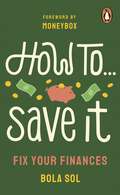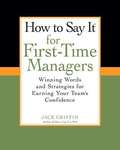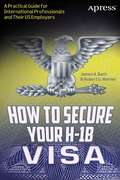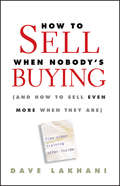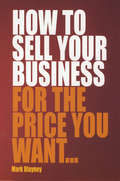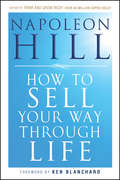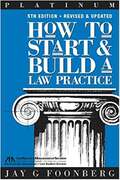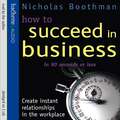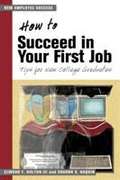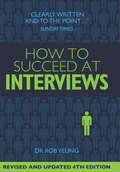- Table View
- List View
How To Save It: Fix Your Finances (Merky How To #6)
by Bola SolIntroducing the new 'How To...' series from #Merky Books: unlock your potential with our short, practical pocket-sized guides._______________________________________________________How To Save It: Fix Your FinancesFixing your finances starts with facing your finances.This indispensable guide will help you confront the awkwardness of having conversations about your money and what to do with it.In seven accessible chapters' financial wellness guru Bola Sol, will guide you through all your money essentials - from saving, to budgeting, dealing with your debt, building your credit, and taking your first steps to investingPacked with practical tips and straightforward advice, this is the book that will change your relationship with money for the better.Written by Bola SolForeword Moneybox_______________________________________________________Designed to inspire and encourage readers to unlock their potential and provoke change, the How To series offers a new model in publishing, helping to break down knowledge barriers and uplift the next generation.Creatively presented and packed with clear, step-by-step, practical advice, this series is essential reading for anyone seeking guidance to thrive in the modern world. Curate your bookshelf with these collectible titles.
How To Save Money: A Guide to Spending Less While Still Getting the Most Out of Life
by Ann RussellWith the recent cost of living crisis, we are all looking for ways to cut bills and save money. Ann Russell, who is best known as "TikTok's Auntie", has lived much of her life on a tight budget, and since energy bills first started rising, has been answering fan's questions not just about cleaning but about all kinds of ways to economise. Following on from her first book, How To Clean Everything, in How To Save Money Ann will share her advice on the best ways to save money and cut back in all sorts of areas, covering everything from budgeting to meal planning and reducing food waste, and from tips on spending less each month to the most energy efficient ways to heat your house, do your laundry etc. Written with Ann's trademark warmth, humour and understanding, this is a book that will help everyone who is looking to spend less while still getting the most out of life.
How To Save Money: A Guide to Spending Less While Still Getting the Most Out of Life
by Ann RussellWith the recent cost of living crisis, we are all looking for ways to cut bills and save money. Ann Russell, who is best known as "TikTok's Auntie", has lived much of her life on a tight budget, and since energy bills first started rising, has been answering fan's questions not just about cleaning but about all kinds of ways to economise. Following on from her first book, How To Clean Everything, in How To Save Money Ann will share her advice on the best ways to save money and cut back in all sorts of areas, covering everything from budgeting to meal planning and reducing food waste, and from tips on spending less each month to the most energy efficient ways to heat your house, do your laundry etc. Written with Ann's trademark warmth, humour and understanding, this is a book that will help everyone who is looking to spend less while still getting the most out of life.
How To Save Money: A Guide to Spending Less While Still Getting the Most Out of Life
by Ann RussellA guide to living more frugally, from everyone's favourite 'TikTok Auntie'.With the recent cost of living crisis, we are all looking for ways to cut bills and save money. Ann Russell, who is best known as "TikTok's Auntie", has lived much of her life on a tight budget, and since energy bills first started rising, has been answering fan's questions not just about cleaning but about all kinds of ways to economise. Following on from her first book, How To Clean Everything, in How To Save Money Ann will share her advice on the best ways to save money and cut back in all sorts of areas, covering everything from budgeting to meal planning and reducing food waste, and from tips on spending less each month to to the most energy efficient ways to heat your house, do your laundry etc. Written with Ann's trademark warmth, humour and understanding, this is an audiobook that will help everyone who is looking to spend less while still getting the most out of life.(P) 2023 Headline Publishing Group Ltd
How To Say It Performance Reviews
by Meryl RunionWritten by two top business trainers, this guide reveals the strategies and language skills needed to make the most of performance appraisals - for both the reviewers and the reviewed. It breaks the process into five simple steps and explains what to say with hundreds of winning phrases organized by topic (and hundreds of counterproductive phrases too). Also included is advice on preparing an agenda, body language, and tone of voice - plus true success and horror stories. .
How To Say It for First-Time Managers
by Jack GriffinAn all-new guide to help first-time managers and supervisors develop effective communication skills for leading and inspiring their staff. From the author of How to Say It(r) at Work, a one-stop communication primer for anyone in a management position for the first time. Covering everything from delegating, planning and running meetings, and mentoring, to building a team and motivating subordinates, this is the perfect reference for anyone who wants to put their best foot forward as they climb the ranks. Topics include: ?Building leadership vocabulary ?Establishing ground rules ?Projecting credibility ?Avoiding day-one mistakes ?Handling crises and criticism ?Motivating and inspiring ?Making meetings work
How To Secure Your H-1b Visa
by James A. Bach Robert G. WernerMulti-finger Haptic Interaction presents a panorama of technologies and methods for multi-finger haptic interaction, together with an analysis of the benefits and implications of adding multiple-fingers to haptic applications. Research topics covered include: design and control of advanced haptic devices;multi-contact point simulation algorithms;interaction techniques and implications in human perception when interacting with multiple fingers. These multi-disciplinary results are integrated into applications such as medical simulators for training manual skills, simulators for virtual prototyping and precise manipulations in remote environments. Multi-finger Haptic Interaction presents the current and potential applications that can be developed with these systems, and details the systemsOCO complexity. The research is focused on enhancing haptic interaction by providing multiple contact points to the user. This state-of-the-art volume is oriented towards researchers who are involved in haptic device design, rendering methods and perception studies, as well as readers from different disciplines who are interested in applying multi-finger haptic technologies and methods to their field of interest. "
How To Sell When Nobody's Buying
by Dave LakhaniThe most effective sales strategies for tough economic times Today's selling environment is tough, and only getting tougher. The old tactics are no longer working, and the current economy is only making selling more difficult. You need sales tactics and strategies that work now and fast . . . even when no one wants to buy-and tactics and strategies that will work even better when they do want to buy. How to Sell When Nobody's Buying is a practical, effective guide to selling even in the toughest of times. This book is packed with new information about creating sales opportunities. Most sales strategies taught today are based on outdated information from ten, twenty, even thirty years ago and they simply don't work today. You'll find the tools and information you need to gain confidence, create powerful alliances, profitable social networks, and drive your profits to unprecedented highs. Whether you sell business-to-business or direct to the consumer, whether you sell real estate or retail, this is the sales guide for you. Features effective, simple strategies for selling in tough economic times Offers free or low-cost prospecting tools that bring in customers by the herd Includes case studies from top salespeople that reveal new ways to bring in customers From sales guru Dave Lakhani, author of Persuasion, Subliminal Persuasion, and The Power of an Hour These days, you need all the help you can get to sell effectively. If you want to increase your sales and drive your business forward-no matter what the economy or your industry does-learn How to Sell When Nobody's Buying.
How To Sell Your Business For the Price You Want
by Mark BlayneySome people only ever sell their business once, usually when they are looking to retire. Others will find themselves selling their businesses a number of times during their careers as they move from one project to the next. But both types of people have one thing in common: they need to get the best deal possible out of the sale.This practical, commonsense book will help to secure the best result. Now updated and revised, it is in its 2nd updated edition. It offers first-hand advice on the whole sale process from deciding why and when to sell through getting the best sale to completing the deal. Charts and examples offer advice on essential legal, financial and strategic issues for all types of enterprises, however big or small your business.
How To Sell Your Business For the Price You Want
by Mark BlayneySome people only ever sell their business once, usually when they are looking to retire. Others will find themselves selling their businesses a number of times during their careers as they move from one project to the next. But both types of people have one thing in common: they need to get the best deal possible out of the sale.This practical, commonsense book will help to secure the best result. Now updated and revised, it is in its 2nd updated edition. It offers first-hand advice on the whole sale process from deciding why and when to sell through getting the best sale to completing the deal. Charts and examples offer advice on essential legal, financial and strategic issues for all types of enterprises, however big or small your business.
How To Sell Your Way Through Life
by Napoleon HillTIMELESS WISDOM from the ORIGINAL PHILOSOPHER of PERSONAL SUCCESS"No matter who you are or what you do, you are a salesperson. Every time you speak to someone, share an opinion or explain an idea, you are selling your most powerful asset . . . you! In How to Sell Your Way Through Life, Napoleon Hill shares valuable lessons and proven techniques to help you become a true master of sales."--Sharon Lechter, Coauthor of Think and Grow Rich: Three Feet from Gold; Member of the President's Advisory Council on Financial Literacy"These proven, time-tested principles may forever change your life."--Greg S. Reid, Coauthor of Think and Grow Rich: Three Feet from Gold; Author of The Millionaire Mentor"Napoleon Hill's Think and Grow Rich and Laws of Success are timeless classics that have improved the lives of millions of people, including my own. Now, we all get the chance to savor more of his profound wisdom in How to Sell Your Way Through Life. It is a collection of simple truths that will forever change the way you see yourself."--Bill Bartmann, Billionaire Business Coach and Bestselling Author of Bailout Riches (www.billbartman.com)Napoleon Hill, author of the mega-bestseller Think and Grow Rich, pioneered the idea that successful individuals share certain qualities, and that examining and emulating these qualities can guide you to extraordinary achievements.Written in the depths of the Great Depression, How to Sell Your Way Through Life explores a crucial component of Achievement: your ability to make the sale. Ringing eerily true in today's uncertain times, Hill's work takes a practical look at how, regardless of our occupation, we must all be salespeople at key points in our lives. Hill breaks down concrete instances of how the Master Salesman seizes advantages and opportunities, giving you tools you can use to effectively sell yourself and your ideas. Featuring a new Foreword from leadership legend Ken Blanchard, this book is a classic that gives you one beautifully simple principle and the proven tools to make it work for you.
How To Shine
by Simon HartleyFIX YOUR MINDSET AND UNLEASH YOUR TALENTSimon Hartley spent many years working with world class athletes and helping them to new levels of achievement. Then he got wondering: What is it that enables some people to develop their talent in a more impactful way than others? What differentiates the winners from those who almost made it? And how can we be world class in our chosen fields?How To Shine is more than just a window into the world of winning. It's the distillation of all Simon has learned from talking to and coaching some of the world's top success stories, from Premiership footballers and Olympiads to champions of business. It's a practical, step by step guide to honing skills which are as vital in the office as they are on the athletics track and truly shining in your field.Includes:Practical, life-affirming tipsInsights into the winning mentality from sportsmen, coaches, Michelin starred chefs and scientistsHow to develop skills which will enable you to be a genuine leader in your field
How To Start A Conversation And Make Friends: Revised And Updated
by Don GaborNow revised and updated for the digital era, the classic bestseller How to Start a Conversation and Make Friends has helped hundreds of thousands of people communicate with wit, confidence, and enthusiasm for more than a generation.Small-talk expert Don Gabor has completely revised and updated this definitive guide, showing how to combine essential techniques in the art of conversation with necessary skills for communicating in the twenty-first century. By following the simple and dynamic guidelines in this easy-to-read book, you’ll be ready to strike up a great conversation anytime, anywhere—whether you’re at a cocktail party or chatting online. Learn how to keep the conversation going by asking the right questions, using body language effectively, and avoiding conversation pitfalls. Combining his tried-and-true methods with a whole new section on communicating online and through social networking, Don Gabor shows you how to: · Identify your personal conversation style· Engage in online conversations using proper etiquette and security· Turn online conversations into face-to-face relationships· Boost your personal and professional speaking skills to the next level Packed with charts, hundreds of opening lines, real-life examples, FAQs, helpful hints, and solid professional advice, How to Start a Conversation and Make Friends will help you connect with others at home, work, online, in person, and everywhere in between.
How To Start And Run a B&B 3rd Edition: A Practical Guide To Setting Up And Managing A Successful Bed And Breakfast Business
by Stewart WhyteREVISED AND UPDATED THIRD EDITION. "Owning a B&B is the dream of many...By giving you the tools to help make your operation a success my hope is that within a short time you will be able to live your dream." More and more people are considering downshifting. Buying a property that can pay for its upkeep and give you a comfortable lifestyle is a popular option. Not only has the interest grown in becoming a B&B proprietor, so has the interest by the public in the B&B as a viable short-break option. With this rise in popularity, however, come expectations, and this is where this book comes in. It will help you: * DETERMINE WHO YOUR CUSTOMERS ARE; * MANAGE THE NECESSARY FINANCIAL TOOLS; * READY YOUR HOUSE FOR B&B OR HELP YOU BUY OR BUILD A NEW ONE; * SUCCESSFULLY MARKET YOUR PROPERTY; * ENSURE YOU MAKE A PROFIT FROM YOUR ENTERPRISE. / In short, everything you need to know to make your B&B a truly special place to stay! This book has been written for would-be and current B&B owners. It can be used as a short course giving invaluable insights for the experienced and inexperienced alike.
How To Start And Run a B&B 3rd Edition: A Practical Guide to Setting Up and Managing a Successful Bed and Breakfast Business
by Stewart WhyteREVISED AND UPDATED THIRD EDITION. "Owning a B&B is the dream of many...By giving you the tools to help make your operation a success my hope is that within a short time you will be able to live your dream." More and more people are considering downshifting. Buying a property that can pay for its upkeep and give you a comfortable lifestyle is a popular option. Not only has the interest grown in becoming a B&B proprietor, so has the interest by the public in the B&B as a viable short-break option. With this rise in popularity, however, come expectations, and this is where this book comes in. It will help you: * DETERMINE WHO YOUR CUSTOMERS ARE; * MANAGE THE NECESSARY FINANCIAL TOOLS; * READY YOUR HOUSE FOR B&B OR HELP YOU BUY OR BUILD A NEW ONE; * SUCCESSFULLY MARKET YOUR PROPERTY; * ENSURE YOU MAKE A PROFIT FROM YOUR ENTERPRISE. / In short, everything you need to know to make your B&B a truly special place to stay! This book has been written for would-be and current B&B owners. It can be used as a short course giving invaluable insights for the experienced and inexperienced alike.
How To Start Selling T Shirts: My Copy And Paste Profit Formula
by Brian GravesI will teach you how to build your own HIGHLY PROFITABLE business selling T-Shirts by COPYING what the most successful sellers are already doing Follow my STEP-BY-STEP guide and build a sustainable business that will generate revenue, day in and day out. <P><P> If you’re reading this, you’re probably looking for a way to earn some extra cash online. And if you’re anything like me, you’ve already wasted countless $ on systems and guides that make unfulfillable promises… "“Earn Hundreds of dollars for only 20 minutes work” “This trading system will earn you THOUSANDS of $ per month on autopilot” <P><P> “Become an overnight millionaire with our system” <P><P> Sound Familiar? They do to me, because I used to fall for these marketing pitches over and over again. Surely, the next one I bought would finally earn me some big bucks on the internet.
How To Start a Business without Any Money
by Rachel BridgeDo you dream of starting your own business but don’t have any money? What if you could set up a venture with nothing but a good business idea and the determination to make it work?It’s an appealing idea, particularly in the current economic climate where no one has cash to spare and austerity rules the day. In fact, studies show that more people start businesses during recessions than at any other time. The good news is that it can be done, provided you follow a few golden rules. Based on Rachel Bridge's popular workshops, this book will help set you on the way to success. As the former Enterprise Editor for the Sunday Times, Rachel has interviewed hundreds of successful entrepreneurs. Join her on her journey as she starts up her very own enterprise, entrepreneurthings.com, and covers all the ups and downs she encounters, while giving examples along the way of how real-life entrepreneurs have coped with the same problems that beset everyone in business at some point.
How To Start and Build a Law Practice
by Jay G. FoonbergA classic ABA bestseller, How to Start and Build a Law Practice has been used by tens of thousands of lawyers as the comprehensive guide to planning, launching, and growing a successful practice. Author Jay G Foonberg, now in his fifth decade of practicing law, has always been dedicated to giving other lawyers the benefit of his wealth of experience. This Platinum Fifth Edition is packed with over 600 pages of guidance on identifying the right location, finding clients, setting fees, managing your office, maintaining an ethical and responsible practice, maximizing available resources, upholding your standards, and much more. If you’re committed to starting—and growing— your own practice, this one book will give you the expert advice you need to make it succeed. More than 100,000 lawyers have turned to Jay Foonberg for the secrets to running a successful law firm; now you can, too, with the new Platinum Fifth Edition. <P><P> Jay Foonberg has organized the book into short, easy-to-read chapters that deal with all the specific challenges you will encounter when you open your office. The answers you'll get are realistic, practical, and based on real-life experience. You’ll find a wealth of tips that can improve your practice once it is up and running, as well as dozens of time-saving templates and checklists. In addition, there is all-new material for this edition, covering topics including: <P><P> New opportunities for serving senior clients and the growth of elder law E-mail and the Internet Law firm mergers and dissolutions The increasing size of student loans Opportunities created by an aging population Nonlawyer consultants The globalization of legal practice When and how to safely close and destroy files The aggressive marketing being done now by firms of all sizes And much more! Even if you already have an established practice, you are sure to find information that will help you compete and succeed. This is the one book you’ll need to build and grow your practice.
How To Start and Run a Holiday Cottage Business (2nd Edition): A Practical Guide To Buying And Letting Holiday Houses
by Gillean SangsterMany people dream of buying a house in the country or near the coast, with outbuildings that can be converted into holiday lets; or of taking over an existing holiday cottage business. Gillean Sangster did it. She moved to Scotland with her husband where they started their own successful holiday cottage business. In this book, she tells you how you can do it too.
How To Start and Run a Holiday Cottage Business (2nd Edition): A practical guide to buying and letting holiday houses
by Gillean SangsterMany people dream of buying a house in the country or near the coast, with outbuildings that can be converted into holiday lets; or of taking over an existing holiday cottage business. Gillean Sangster did it. She moved to Scotland with her husband where they started their own successful holiday cottage business. In this book, she tells you how you can do it too.
How To Succeed As A Freelancer In Publishing
by Charlie Wilson Emma MurrayThis book tells you how to build a successful freelance business around supplying publishing services. The publishing industry depends on freelancers: writers and editors, proofreaders and designers, PR and typesetters. For those in the know, there is a wealth of opportunities on offer. Graduates, retired professionals, in-house editors, career-changers more and more people are taking the plunge and going freelance. You can succeed as a freelancer in publishing, and this book shows you how. It includes top tips; insider knowledge and case studies; information on how to market yourself, deal with finance and find out what your clients are looking for plus invaluable insights from other successful freelancers and industry experts.
How To Succeed As A Freelancer In Publishing: The Complete Guide - 'a Must-have For Any Freelancer Who Wants To Earn A Decent Living In Publishing'
by Charlie Wilson Emma MurrayThis book tells you how to build a successful freelance business around supplying publishing services. The publishing industry depends on freelancers: writers and editors, proofreaders and designers, PR and typesetters. For those in the know, there is a wealth of opportunities on offer. Graduates, retired professionals, in-house editors, career-changers more and more people are taking the plunge and going freelance. You can succeed as a freelancer in publishing, and this book shows you how. It includes top tips; insider knowledge and case studies; information on how to market yourself, deal with finance and find out what your clients are looking for plus invaluable insights from other successful freelancers and industry experts.
How To Succeed In Business In 90 Seconds Or Less
by Nicholas BoothmanPersuade a client to buy what you're selling. Energise the boss to act on your ideas. Rally the staff to see themselves as members of your team. No matter what the situation, success in business depends on having effective relationships. Nicholas Boothman's first book, HOW TO MAKE PEOPLE LIKE YOU IN 90 SECONDS OR LESS was a huge success. Now Boothman brings his innovative system of forging instant connections to the workplace. This is a book that deals not only with the importance of making a great first impression, but also with ongoing business relationships. Based on the breakthrough idea of rapport by design' HOW TO SUCCEED IN BUSINESS shows how to mine the potential in every situation, from an accidental meeting at the water cooler, to a brainstorming session, to a formal presentation before a large group. It digs into the fundamentals of persuasion, purpose and personality to get to the basis of self-confidence and effective communication. It covers traditional business concerns of team building, email and phone relationships and managing up and managing down.
How To Succeed In Your First Job: Tips For New College Graduates
by Elwood F. Holton Sharon S. Naquin Berrett-Koehler Publishers Inc. StaffPart One of a three-part series of a series of practical guidebooks on work transitions. These new books guide new hires-and their managers-step by step through the "breaking-in" process that is absolutely essential for helping new employees thrive. It is relatively easy to get new hires to be competent to perform the basic tasks they were hired to do. But success on the job is due to much more than that. It comes from understanding how the organization really works-the unique aspects of how things get done in that particular organization. And it comes from learning how to "fit in"-knowing how to get accepted, get respected, and earn credibility.
How To Succeed at Interviews 4th Edition
by Dr. Rob YeungThe new edition of this best-selling book tells you how to: * Give impressive answers to over 200 interview questions * Deal with interview nerves and project total confidence * Pass psychometric tests, competency-based questions, and assessment centres * Avoid the traps that interviewers lay for unwary job seekers * Turn every interview question to your advantage
